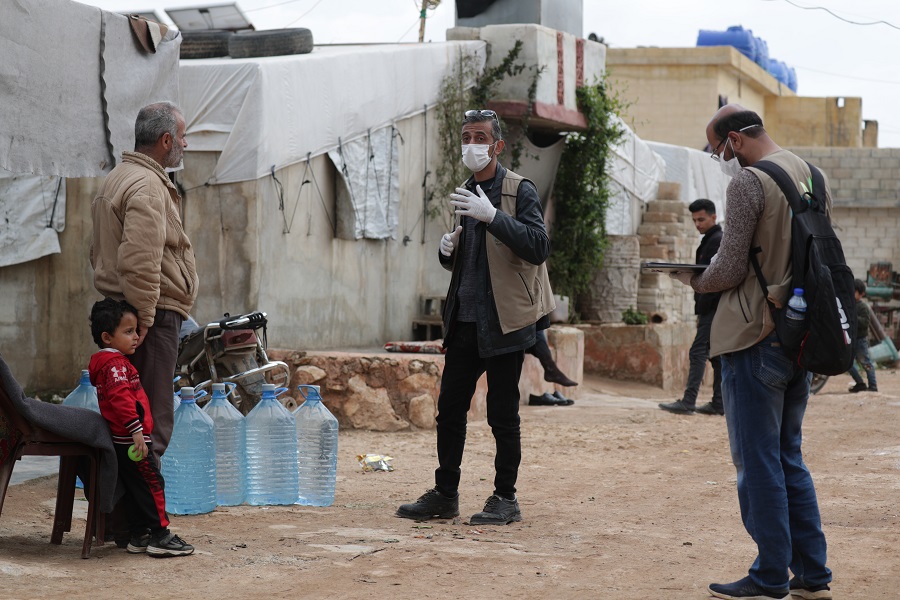 Community health workers in the Mashhad Rouhin camp in Idlib, northwestern Syria, talk to a resident to raise awareness of an ongoing cholera epidemic. Credit: WHO//Khalil Ashawi
Community health workers in the Mashhad Rouhin camp in Idlib, northwestern Syria, talk to a resident to raise awareness of an ongoing cholera epidemic. Credit: WHO//Khalil Ashawi
Cairo, 6 September 2023 – Affected by conflict for more than 12 years, Syria is experiencing a protracted complex political and socioeconomic crisis. The country has been grappling with various recurrent epidemics and outbreaks amid the severely deteriorated living conditions.
Collective efforts have been made at the Whole of Syria level, and in all operational response areas, to contain and respond to the cholera outbreak. Health, risk communication and community engagement (RCCE) and water, sanitation, and hygiene (WASH) partners are supporting several activities based on various response pillars.
An operational review of the ongoing cholera outbreak response in Syria was carried out in May 2023. Recommendations of the review report include to:
address gaps in surveillance, WASH, and infection prevention and control;
scale up the system for referrals, especially from hot-spot areas;
strengthen the supply chain;
support the rehabilitation, operation and maintenance of water and sanitation infrastructure;
foster community engagement and inclusion, and unify messaging among partners, to ensure an effective and sustainable response.
Cholera operational review process
The cholera operational review for the Whole of Syria response concluded on 16 May 2023. Fifty-five experts took part – including representatives of the WASH and Health clusters, RCCE coordinators, technical officers from the United Nations Children’s Fund (UNICEF) and WHO, plus other partners.
“The Whole of Syria intersectoral review of the cholera preparedness and response plan is a critical step to ensure we are responding effectively to the cholera outbreak in all parts of the country,” said Dr Iman Shankiti, acting WHO Representative to Syria. “It also provides a foundation for collaborative learning – building upon experiences over the past year and positioning Syria to effectively manage cholera risk and strive for elimination in the country through an integrated approach.”
Review participants examined the ongoing cholera outbreak response in Syria, discussed actions to date and identified key challenges. A qualitative participatory approach was used, guided by the “WHO guidance for after action review [1]”, the Global Taskforce for Cholera Control (GTFCC) Cholera Preparedness and Response Framework [2] and the Whole of Syria response plans.
The review report recommends various short-term corrective actions. It also sets out strategic actions that will help to eliminate cholera in the country in the longer term.
A Whole of Syria cholera intra-action review report will now be prepared. Its purpose will be to inform future actions and strategies; to update the July–December 2023 Cholera Response Plan – including by identifying high-risk areas for preparedness, prevention, and response, and developing targeted prioritization activities plan accordingly.
Background to cholera outbreak and response
Some 6.9 million people in Syria are internally displaced and up to 90% of the population live below the poverty line.
Currently, at least 8 million people in the country are at increased risk of acute watery diarrhoea owing to the ongoing water crisis, damaged water and sanitation networks, overcrowded sites for displaced people, and lack of access to WASH services.
The devastating earthquake of February 2023 disrupted the cholera response in Syria. The disaster also increased the risk of cholera, with reception centres sometimes overcrowded, fragile WASH infrastructure damaged, and response partners’ access and capacity curtailed.
Related link
Whole of Syria cholera intra action review report, July 23 2023
[1] WHO Guidance for after action review
[2] The Global Taskforce for Cholera Control (GTFCC): organization of the response


